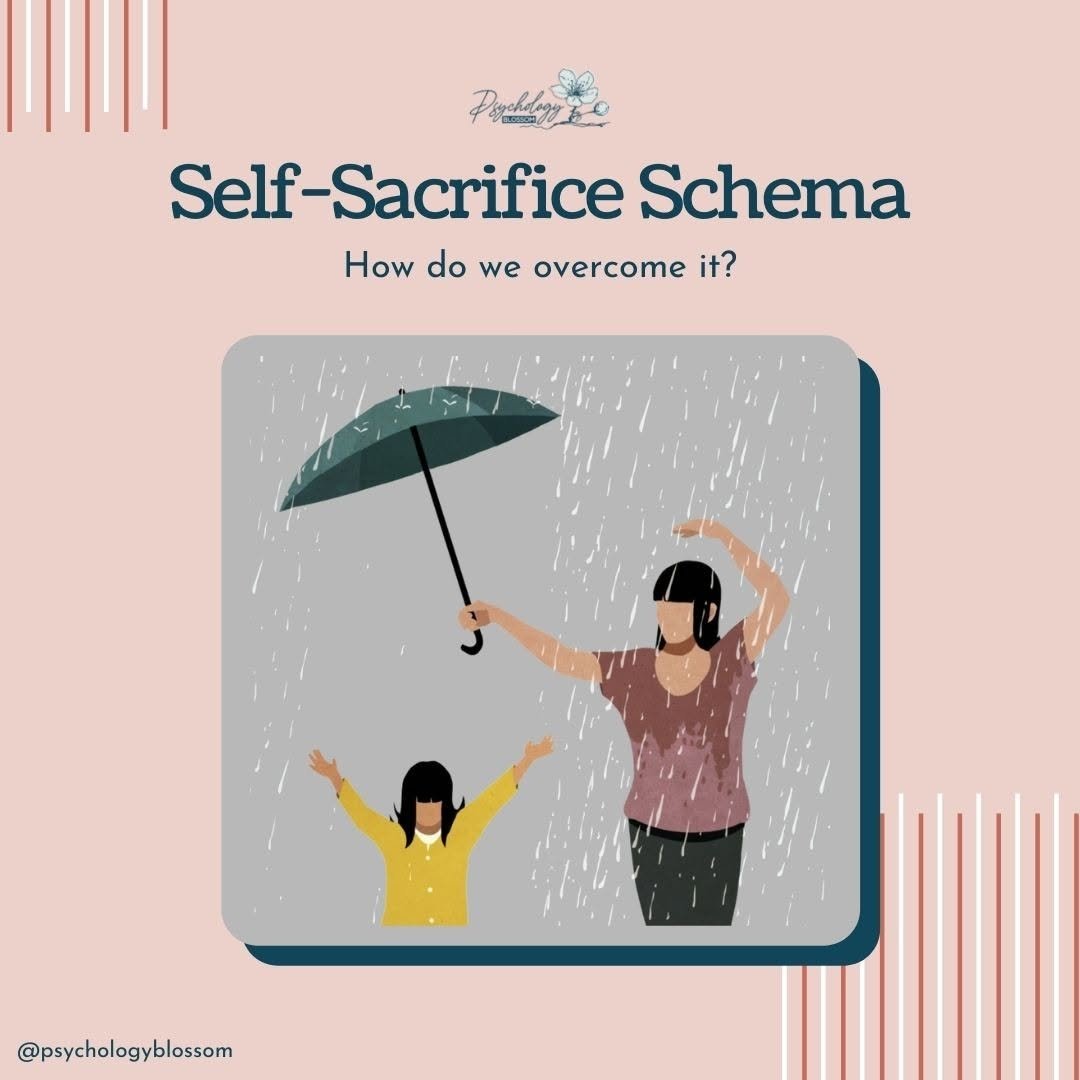Before diving into specific schemas, you might want to read our
introduction to Schema Therapy.
It provides a clear overview of the model and how schemas are understood and worked with in therapy.
Self-Sacrifice Schema: When Helping Others Comes at a Cost
We all may occasionally put the needs of others before our own. However, if we have developed a Self-Sacrifice Schema, we may find ourselves excessively meeting the needs of others, while neglecting our own. There are various motivations for this kind of behaviour, such as:
- The fear of displeasing someone
- Feeling guilty for being selfish when tending to our own needs
- Concerns about hurting or abandoning others by not being available at any point in time
We may also confuse the Self-Sacrifice Schema with the Subjugation Schema. Both involve putting others first, but the underlying motivations differ. Those with a Self-Sacrifice Schema act voluntarily, often to prevent others from feeling hurt or because they believe it is “the right thing to do.” In contrast, those with a Subjugation Schema act to avoid punishment or conflict.
Reactions from the Self-Sacrifice Schema
✽ Surrender
Giving everything you have to those around you and completely forgetting about yourself. This may lead to exhaustion, resentment, or a diminished sense of identity over time.
✽ Avoidance
Taking in care, compliments, or time for yourself can feel uncomfortable, creating feelings of shame or embarrassment. To avoid such discomfort, you might withdraw from situations where giving or receiving is expected.
✽ Overcompensation
Setting very rigid boundaries to ensure you do not have to give or take. While this may protect your energy, others might perceive it as selfishness or emotional coldness.
Effects of the Self-Sacrifice Schema
The Self-Sacrifice Schema can cause individuals to feel tired and worn out from constantly helping others. Because their efforts are often not reciprocated, they may begin to feel resentful, unappreciated, and undervalued.
Over time, these individuals identify themselves as people who “do not need others” and pride themselves on coping alone. This makes it difficult for them to ask for help or even recognise what their needs are. As a result, they may suppress their desires until stress, emptiness, or resentment begins to surface.
Internally, this schema can create significant psychological strain. It often manifests as chronic stress, burnout, or even physical symptoms such as fatigue or tension. Emotionally, individuals may struggle with low self-worth, because their identity becomes tied to what they do for others rather than who they are.
Possible Causes
This schema is typically rooted in childhood. It often develops in families where children were expected to prioritise the needs of others. For example, a child might have been required to take care of a parent, or they may have grown up observing parents who always cared for others while neglecting themselves.
Children in these environments learn that their feelings and needs are less important. They may internalise the belief that being “selfless” is the only way to be worthy of love or acceptance. Over time, this belief becomes ingrained and persists into adulthood.
Living with the Self-Sacrifice Schema
Adults with this schema often find themselves in relationships where they give far more than they receive. This can create imbalances, where their kindness is exploited or overlooked. At work, they may volunteer for extra tasks, carry other people’s responsibilities, and rarely say “no.” Although they may be seen as dependable, they often feel overburdened.
In relationships, this schema can create tension. A partner may become used to the imbalance, while the individual silently accumulates resentment. Over time, this can damage intimacy and lead to conflict. Friendships may also remain shallow, as those with a Self-Sacrifice Schema may avoid expressing their real needs or opinions.
Treatment
The primary treatment for this schema is Schema Therapy. This therapeutic approach delves into early life experiences and helps clients identify where their self-sacrificing tendencies began. Using a combination of cognitive, behavioural, experiential, and interpersonal techniques, therapists work with clients to challenge and reframe these deeply held beliefs.
Some therapeutic activities may include:
- Rehearsing adaptive behaviours in imagery or role-play
- Behavioural homework, such as practicing saying “no” or “I will think about it”
- Involving supportive friends and family to reward healthier, more balanced behaviour
Over time, therapy empowers individuals to identify and express their needs, build healthier boundaries, and create more balanced relationships. This does not mean abandoning kindness or generosity but learning to integrate them in a way that does not come at the expense of personal wellbeing.
If you recognise yourself in this schema, reaching out for professional support can help you shift from self-neglect to self-respect, allowing you to care for both yourself and others in a healthier way.
We recommend This Video to those who want to learn more about the Self-Sacrifice Schema.
